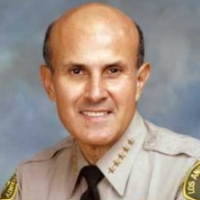L.A. County’s Beleaguered Top Cop Is Nation’s Sheriff of the Year
 Sheriff Lee Baca
Sheriff Lee Baca
The National Sheriffs’ Association overcame whatever reservations its members may have about selecting a heavily criticized officer under investigation by the FBI and picked Los Angeles County’s top cop, Lee Baca, as its annual Sheriff of the Year.
Not everyone loved the choice. “You’ve got to be kidding,” Southern California ACLU legal director Peter Eliasberg told the Los Angeles Times, citing “years of malfeasance in the jails and the blatant failure of the sheriff to address the problems.”
When Baca was first sworn in as sheriff in 1998, he acknowledged that the sheriff’s department had a deserved reputation for excessive force and pledged to do something about it. Fourteen years later, an FBI investigation of deputy misconduct and violence was just one of multiple investigations being conducted of Baca and the department.
An internal affairs investigation was looking at allegations that a clique within an elite anti-gang unit proudly wore special tattoos of armed skeletons that celebrated shootings. Two retiring supervisors last year described how deputies beat up prisoners in county jails without interference from higher-ups. Separate federal probes are looking at allegations that deputies harassed minorities in the Antelope Valley, north of the city of Los Angeles, and that a Baca captain helped an alleged drug trafficker.
Baca has been accused of giving special treatment to friends and supporters, and a Times report linked Baca to the questionable hiring of his nephew, who was then implicated in jailhouse abuse.
Thomas Parker, a former assistant special agent in charge of the FBI’s Los Angeles officer, wrote a report in 2011 for the American Civil Liberties Union that concluded Baca and his deputies had “essentially abdicated their responsibilities to provide a safe, secure, and corruption-free incarceration environment within the Los Angeles County Jail system.”
The ACLU report detailed a string of alleged jailhouse beatings and abuse, and was followed by a lawsuit seeking Baca’s resignation. The suit claimed the brass “acquiesced in, fostered, and implicitly authorized" the abuse.
Baca, who runs the largest sheriff’s department in the country (with a $2.5 billion budget and 18,000 sworn and professional staff), belatedly embraced 63 reforms proposed last October by the Citizen’s Commission on Jail Violence.
In giving Baca the award, the sheriffs’ association noted the county’s low crime rate and high arrest record, and cited his promotion of programs that educate inmates, embrace religious community participation, and send deputies into schools to talk about gangs. Baca is credited with developing Education-Based Incarceration (EBI), a program aimed at lowering recidivism rates among inmates.
The Los Angeles Daily News editorial page speculated that Baca, who has steadfastly denied responsibility for problems at the jail, might begin his acceptance speech at the NSA’s annual conference in North California June 23, “I'd like to blame all the little people. . . .” The editorial likened Baca’s winning the award as equivalent to the film “John Carter” winning Best Movie at the Oscars.
–Ken Broder
To Learn More:
Lee Baca Named America's ‘Sheriff of the Year’ Despite Jail Violence (by Dennis Romero, LA Weekly)
Baca Named Sheriff of the Year Despite Criticism, U.S. Probe (by Robert Faturechi, Los Angeles Times)
Cruel and Usual Punishment: How a Savage Gang of Deputies Controls LA County Jails (American Civil Liberties Union of Southern California)
- Top Stories
- Controversies
- Where is the Money Going?
- California and the Nation
- Appointments and Resignations
- Unusual News
- Latest News
- California Forbids U.S. Immigration Agents from Pretending to be Police
- California Lawmakers Urged to Strip “Self-Dealing” Tax Board of Its Duties
- Big Oil’s Grip on California
- Santa Cruz Police See Homeland Security Betrayal in Use of Gang Roundup as Cover for Immigration Raid
- Oil Companies Face Deadline to Stop Polluting California Groundwater





